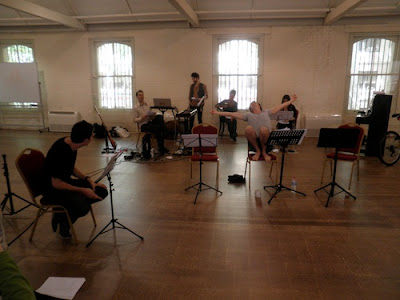Watching Thomas Ostermeier's production of Hedda Gabler - the first of his works I've seen - was unexpectedly fascinating. Through directors such as Benedict Andrews, a stablemate of Ostermeier's at Berlin's Schaubühne, the aesthetic of Ostermeier and his peers has had a profound influence on contemporary Australian theatre. So much of the design language here - architectural spaces defined by mirrors and windows, revolves, projections, pop references - is immediately familiar. I felt as if I were looking through the wrong end of a telescope: in the face of what's followed Ostermeier, Hedda Gabler, which premiered in 2005, feels like a museum piece.

What's immediately striking is its deliberate affectlessness. This is a production which strikes a note of cool anomie, creating a surface elegance that expresses a monumental sense of boredom. The play has been updated, in a light adaptation by Marius von Mayenburg, to contemporary times. As is usual with such adaptations, violence has been done along the way: here Ibsen's play becomes a scathing miniature, a portrait of an emotionally numbed, intellectually trivial bourgeoisie. The problem, as always in contemporary adaptations of Ibsen, is how to make the social imprisonment of his feminine characters believable now. Here the solution is to make Hedda and her peers improbably shallow and stupid. Hedda's destructive actions become endowed with a vacuum of un-meaning: her twisted rebellion against the suffocation of her life becomes the moue of a spoilt child.
At this point, I started wondering if the theatre itself was as cynical as the actions of the characters it portrays. Which is to say, there's something too easy in this act of épater le bourgeoisie: nothing is at emotional risk, and so nothing matters. Compared with other recent Ibsen adaptations - Simon Stone's devastating Belvoir St production of The Wild Duck, for instance, or Daniel Schlusser's recent The Dollhouse - it felt like a one-dimensional experience: there was none of the textual radicality of those two very different productions, and little ambiguity of meaning. I admired the consistency, the almost bloody-minded formalism, of Ostermeier's approach, but coldly: and in the end, I left untouched.
Mayenburg's adaptation follows the play closely: the maid is cut from the character list, but otherwise all the characters and actions remain, albeit slightly updated (for example, the manuscript Hedda burns is changed to a laptop that she hammers to bits). The interpretation here is in the production, beginning with Jan Pappelbaum's design, an evocation of a sleek modernist house with walls of windows and polished concrete. It's set on a revolve and becomes the shifting planes for various between-scene projections. Above the set is a huge mirror, which gives us a voyeur's eye view of the actors when they move off-stage.
The performances are heavily naturalistic, with all the action set around the designer settee or on the verandah. This naturalism clashes with a stylised melodrama that attends the play's climactic moments. There is little sense - except in a couple of moments in Kay Bartholomäus Schulze's performance of the unstable Løvborg - of emotional pressure building under repression: most instances of emotional behaviour are play-acting, as studiedly conscious as Hedda's (Katharina Schüttler) feline restlessness. I don't know whether it's relevant that Schulze reminded me insistently of Julian Assange, but that association might have thrown a different kind of bomb into the action.
Hedda's motivations become almost an abstraction of the Pinteresque: she is solely interested in gaining power over others, and when she finds herself at the wrong end of the machinery, she tops herself. There is little sense of her initial powerlessness to illuminate this behaviour, and almost none of her radical longing for a more glorious, more beautiful world than the one in which she finds herself. Ibsen's Hedda has always been selfish, but has seldom been more trivial.
When the play steps into unreality - especially in its final moments, when Hedda's suicide prompts a ripple of dismissive laughter and shrugged shoulders from her husband and friends - it permits only cerebral response. Hedda and the gang are symbols merely, flattened-out representations of the conscious heartlessness of the middle classes, absorbed in their trivial pursuits as they turn their faces from the blood on the walls.
This insight may contain a general (and deeply angered) truth, but in the particular truths with which theatre deals it lacks any kind of emotional logic. I found it increasingly impossible to believe in people so determinedly shallow. We conclude that all these characters who we've been watching for the past two hours are psychopaths with empathy by-passes, and ... so? As audience members, no matter how selfishly middle class we might be, we all know that we are empathetic creatures, unlike those we've been watching on stage. Why else would we be here, elite beings, enjoying the fruits of culture? So what does this have to do with us?

Pan Pan's good-humoured production of The Rehearsal, Playing the Dane induced similar thoughts, although this production by no means seeks the cool affectlessness of Hedda Gabler. It too transforms a tragedy into a comedy, this time by opening up, Ayckbourn-style, the machinations behind the scenes.
The audience walks into a stage dressed as a rehearsal space, with the actors piled on a big table, like the heaps of corpses that finish most of Shakespeare's tragedies. Local academic Dr Sue Tweg stands forward and delivers a short lecture on Hamlet, one of the most performed of Shakespeare's plays.
The lecture, by Amanda Piesse, senior lecturer at Trinity College Dublin, is about the instability and polysemity of Shakespeare's texts, and introduces the premises of the work of theatre we're about to see. Tweg holds a handsome Great Dane, who tugged her impatiently as she mentioned instability, creating one of several ripples of serendipity that illuminate the performance, before finishing with an ear-rakingly awful rendition of Greensleeves on a recorder.
The instability of interpretation and role is then reinforced by the "director" arranging a reading of a scene from Hamlet, assigning the roles to the most improbable actors: the guy who's obviously Polonius (Daniel Reardon) plays Hamlet, and so on. At this point an audience member is called up on stage to read one of the smaller parts.
We then watch as three actors audition for the role of Hamlet before a table of people which includes the Melbourne Theatre Company's own casting director, Kylie McCormack. Each actor brings his own story and own twist on the role, and these are hugely entertaining comic pieces. They also permit, almost by-the-bye, a look at the different facets of a couple of scenes, as they are repeated by different actors. The upshot is that the audience is invited on stage, to choose which of the three auditionees ought to play Hamlet in the second half of the show.
What follows is a dramaturgically slashed version of the play, watched from backstage by the shadowy production crew. The connections between Hamlet's existential dilemmas and Beckett's Endgame - signalled in the first half by a short performance during an audition of a speech by Hamm - are here hammered (haha) home by a proliferation of dustbins arranged around the set. The action revolves around the players - here performed by drama students in school uniform from Trinity Grammar School - the grave scene, Ophelia's mad scene and the massacre at the end of the play. The show is rounded off with a brief conclusion from the academic.
It all passes pleasantly enough, but feels curiously unsatisfying. It's actually hard to see how this illuminates Hamlet beyond the points made in the introduction: Shakespeare's reflexive games with performance, identity and play; the ambiguities of his meanings; its essentially performative nature as a text. It did feel as if the lecture was a kind of safety net, ensuring that the audience "got" it, and lifting the risk from the rest of the production. And it seemed to me that the meanings given us enclosed possibility, rather than opening it through performance. There are times when it seems - deliberately, I'm sure - like a parody of bad avant garde performance: experiment without the danger of taking it too seriously. The dog provided some moments of anarchic interruption, as animals do, but I still wasn't convinced that it was more than a bad pun.
What I missed was more of the emotional realism Judith Roddy brings to the role of Ophelia, so the production might shift more radically between the realities it represents - rather as happens, say, in Ganesh and the Third Reich. (As a side note: on the strength of his performance as a Player and the Queen, watch out for Trinity Grammar student Tim Dennett.) There are lots of in-jokes for theatre nerds here, lots of audience-friendly invitation, but not, for all the activity around it, a lot of Shakespeare. I'm all for blowing up the classics: but I want the resulting fragments to add up to more than the sum of their parts.
Pictures: top: Katharina Schüttler as Hedda Gabler; below, Conor Madden as a possible Hamlet in The Rehearsal, Playing the Dane.
Hedda Gabler by Henrik Ibsen, directed by Thomas Ostermeier. Set design by Jan Pappelbaum, costumes by Nina Wetzel, music by Malte Beckenbach, dramaturgy by Marius von Mayenburg, video by Sebastien Dupouey, lighting Erich Schneider. With Annedore Bauer, Wolfgang Bauer, Lars Eidinger, Kay Schulze, Katharina Schüttler and Lore Stefanek. Schaubühne Berlin and Melbourne Festival, Arts Centre Playhouse, until October 23.
The Rehearsal, Playing the Dane, by William Shakespeare, directed by Gavin Quinn. Designer Aedín Cosgrove, costumes by Sarah Bacon, dramaturge Simon Doyle. With Andrew Bennett, Derrick Devine, Conor Madden, Bashir Moukarzel, Gina Moxley, Daniel Reardon, Judith Roddy. Also Dr Sue Tweg, the Venerable Eden-Elizabeth Nicholls and students from Trinity Grammar School, Kew. Pan Pan Theatre, Melbourne Festival. Merlyn Theatre, Malthouse until October 22.
Read More.....




























